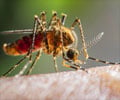Rising temperatures along with political chaos are responsible for increased range of disease-bearing mosquitoes in Honduras.

‘Better governance, bigger budgets, proper government programs to prevent dengue, reliable public water supply could have reduced the burden of dengue in Honduras.’
Read More..




Around 40 percent of the dengue deaths of Central America were reported from Honduras this year, and in 2018, only three people in Honduras died from the disease, according to the Pan American Health Organization.Read More..
In Honduras, health officials trace the start of the current epidemic to the fall of 2018. The number of incidents then rose sharply during the first half of 2019, hitting a peak this summer before falling off as the year ended. A nationwide health emergency declared in July by the administration of President Juan Orlando Hernández remains in effect.
Government plans to privatize the health and education sectors, high murder rates, widespread poverty, people migration made the epidemic worse.
Surveillance programs to identify outbreaks of mosquito-borne diseases were inefficient.
“In another country there would be many sick but not as many deaths,” said Eduardo Ortíz, an adviser on sustainable development and environmental health for the Pan American Health Organization in Honduras. “The cure for dengue is political.”
Advertisement
Dr. Dinorah Nolasco, the regional health director in Cortés, said they people had trouble getting access to few neighborhoods where armed gangs hold sway and harbor a suspicion of outsiders, particularly from the government.
Advertisement
Better governance, bigger budgets would have helped contain the Honduran epidemic. But, meteorological conditions are beyond the ability of the country to mitigate.
Severe drought in September, unexpected bouts of intense rainfall in the absence of a strong governmental program of disease control, has allowed dengue to flourish.
During periods of extreme drought, residents living in neighborhoods without a reliable public water supply — as is the case in much of Honduras — will sometimes store water in their homes, providing more potential mosquito breeding sites. And during heavy rainfall, flooding can provide more breeding environments, particularly in areas with poor drainage systems.
“With climate change, we have rainy periods where there were once dry periods, dry periods when there was rain,” Dr. Nolasco lamented. “Before we had three cycles of spraying. Now we have to spray year-round.”
“In general, climate change is one of the multitude of factors affecting dengue,” said Rachel Lowe, an associate professor at the London School of Hygiene & Tropical Medicine, who researches the connection between climate and the spread of diseases.
Medindia











